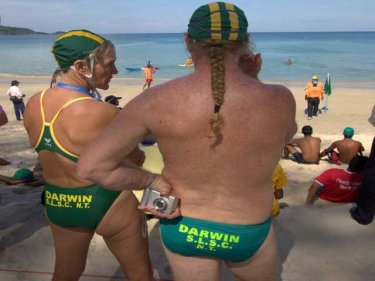IT WAS wonderful to see DARWIN SLSC on a couple of bums on the white sand at Patong today.
Why? Because it means the Aussie surf rescue culture has arrived on Phuket.
And bums with Patong SLSC emblazoned on them are likely to be seen soon, along with bums from Kata, Karon and other beach destinations.
Why?
Because drownings on the island are another of those topics that few people in the tourist industry want to talk about.
Who can saw how many drownings there are each year? (Answer: Too many.)
Who keeps the statistics? (Answer: Nobody seems to know precisely how many people die in the water around Phuket. Tourists might be frightened away.)
Red flag warnings are ignored. Lifeguards are often talked about, but seldom seen.
A Korean honeymooner has one drink too many, and dies in a hotel pool the day after his wedding . . . a local expat gets caught in a beach rip and is pulled to his death.
What is certain is that drownings happen all too often, and many of them are locals, not tourists.
One vital statistic is extremely plain: every drowning is unnecessary.
Australian Jayne MacDougall, a Phuket resident and one of the pioneer organisers of Saturday's first Phuket Lifesaving Carnival at Patong, knows those Darwin-branded Speedo bums are part of the process that will eventually save more lives.
''What's needed is a change in culture and education about how to swim and how to save people at pools and beaches,'' she told Phuketwan.
Saturday saw teams from Australia compete with teams from Thailand in some of the swimming and running events that go to make big surf lifesaving carnivals in Australia, home of the lifesaving culture.
In Australia, fit young men and women along the sprawling coastal cities spend weekends protecting the beaches and carry out heroic rescues if necessary.
Beyond the rescue service is a basic education program that sees learning to swim as a vital necessity for anyone who goes onto the water, especially people who live on islands.
Fortunately, Phuket's new OrBorJor president Paiboon Upatising supports learning to swim in schools and backed the first lifesaving carnival at Patong.
Organisers had just six weeks to bring the program together, but even so, teams came from Australia and Krabi, and some observers visited from Bangkok to see what is involved in the lifesaving philosophy.
They should have been impressed, just like the crowd of onlookers on Saturday.
Because Thailand already has a very strong culture involving charity and foundation work, it seems only a short stretch from there to embrace a beach culture that emphasises the same elements, plus healthy exercise, and saving lives in the water.
Lifesaving clubs in Australia provide a social and community network for young men and women, and the same elements of sun and surf should make it possible to replicate the sport in Thailand.
Swimming clubs here are probably the first groups to engage in the health and fitness aspects that come with the surf rescue culture.
Le Meridien Phuket has been a pioneer in trying to inculcate rescue techniques at Phuket resorts.
But the big leap forward will probably come through locals adopting the surf lifesaving movement, backed by the OrBorJor and other local organisations.
The second Phuket Surf Lifesaving Carnival has already been scheduled for July 2009, when the waves will be a little larger and the Thais and Aussies involved will be able to show how reel rescues are performed.
Look for bums with labels on them from all over Thailand and Australia.
For more information, contact Jayne MacDougall at 089-6452576 or e: thailifeguard@gmail.com










Well Jayne, what can I say, this must have been right up your street!! -- Paul
Posted by Anonymous on October 14, 2008 16:40